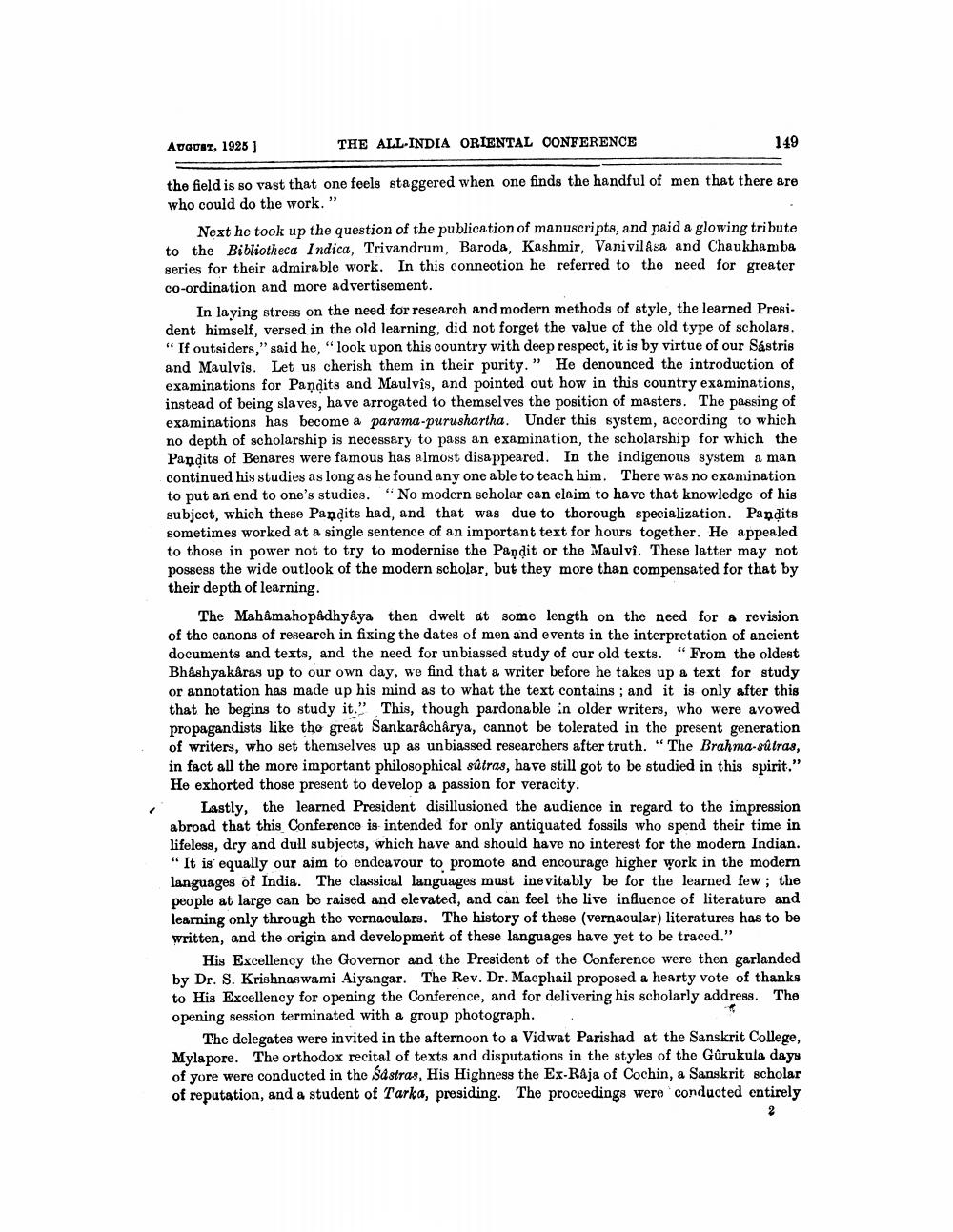________________
AUGUST, 1925]
THE ALL-INDIA ORIENTAL CONFERENCE
149
the field is so vast that one feels staggered when one finds the handful of men that there are who could do the work."
Next he took up the question of the publication of manuscripts, and paid a glowing tribute to the Bibliotheca Indica, Trivandrum, Baroda, Kashmir, Vanivilasa and Chaukhamba series for their admirable work. In this connection he referred to the need for greater co-ordination and more advertisement.
In laying stress on the need for research and modern methods of style, the learned President himself, versed in the old learning, did not forget the value of the old type of scholars. "If outsiders," said he, "look upon this country with deep respect, it is by virtue of our Sástris and Maulvis. Let us cherish them in their purity." He denounced the introduction of examinations for Pandits and Maulvis, and pointed out how in this country examinations, instead of being slaves, have arrogated to themselves the position of masters. The passing of examinations has become a parama-purushartha. Under this system, according to which no depth of scholarship is necessary to pass an examination, the scholarship for which the Pandits of Benares were famous has almost disappeared. In the indigenous system a man continued his studies as long as he found any one able to teach him. There was no examination to put an end to one's studies. "No modern scholar can claim to have that knowledge of his subject, which these Pandits had, and that was due to thorough specialization. Pandits sometimes worked at a single sentence of an important text for hours together. He appealed to those in power not to try to modernise the Pandit or the Maulvi. These latter may not possess the wide outlook of the modern scholar, but they more than compensated for that by their depth of learning.
The Mahamahopadhyaya then dwelt at some length on the need for a revision of the canons of research in fixing the dates of men and events in the interpretation of ancient documents and texts, and the need for unbiassed study of our old texts. "From the oldest Bhashyakaras up to our own day, we find that a writer before he takes up a text for study or annotation has made up his mind as to what the text contains; and it is only after this that he begins to study it." This, though pardonable in older writers, who were avowed propagandists like the great Sankaracharya, cannot be tolerated in the present generation of writers, who set themselves up as unbiassed researchers after truth. "The Brahma-sûtras, in fact all the more important philosophical sûtras, have still got to be studied in this spirit." He exhorted those present to develop a passion for veracity.
Lastly, the learned President disillusioned the audience in regard to the impression abroad that this Conference is intended for only antiquated fossils who spend their time in lifeless, dry and dull subjects, which have and should have no interest for the modern Indian. "It is equally our aim to endeavour to promote and encourage higher work in the modern languages of India. The classical languages must inevitably be for the learned few; the people at large can be raised and elevated, and can feel the live influence of literature and learning only through the vernaculars. The history of these (vernacular) literatures has to be written, and the origin and development of these languages have yet to be traced."
His Excellency the Governor and the President of the Conference were then garlanded by Dr. S. Krishnaswami Aiyangar. The Rev. Dr. Macphail proposed a hearty vote of thanks to His Excellency for opening the Conference, and for delivering his scholarly address. The opening session terminated with a group photograph.
The delegates were invited in the afternoon to a Vidwat Parishad at the Sanskrit College, Mylapore. The orthodox recital of texts and disputations in the styles of the Gurukula days of yore were conducted in the Sastras, His Highness the Ex-Raja of Cochin, a Sanskrit scholar of reputation, and a student of Tarka, presiding. The proceedings were conducted entirely
2




